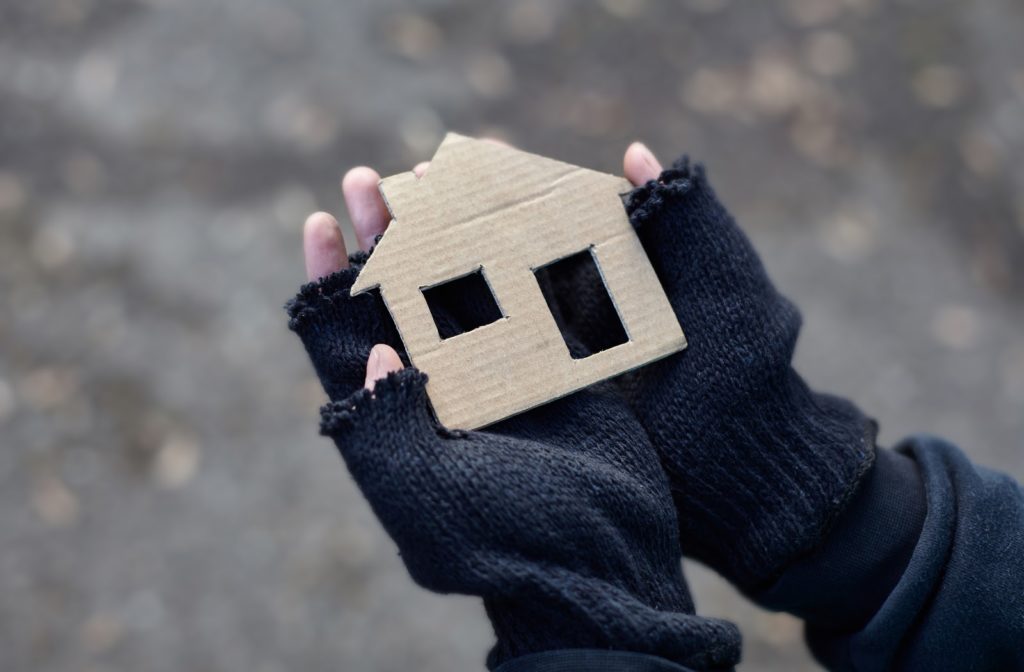Homelessness can be defined as the absence of adequate, permanent, or sustainable access to shelter; this includes couch surfing or living in a car. Most people experiencing homelessness do not have the income to sustain their most basic needs. Homelessness is a systemic issue but can also be the result of: poor mental and physical health, subjection to previous violence and abuse, and a shortage of affordable housing. If you want to lend some support to the homeless population in your community, you can find somewhere to volunteer or donate to as a way to help.
Sheltered Homelessness
Sheltered homelessness refers to the homeless population that stays in shelters or uses housing programs. Shelters in Canada include emergency shelters, traditional housing shelters, and violence against women shelters.
Unsheltered homelessness encapsulates the homeless population that spend their nights in public or private areas not intended for human habitation.
“Hidden” Homelessness
This is when people who do not have adequate shelter stay for prolonged periods of time with friends or family members. Being a “hidden” homeless person can also be characterized by living full time in a car or other vehicle, and couch surfing. Oftentimes these people will switch the residencies they are staying at and continuously move to new ones. Nearly 1 in 10 Canadians have experienced hidden homelessness in their lifetime.
Runaways
These are people (usually youth) who either run away from home or are abandoned on the streets. Usually, these people are significantly affected by abuse or mental and physical trauma.
Homelessness in Canada
- From 2010 to 2017, 39,408 unique individuals were identified as experiencing homelessness in Ontario.
- In Canada, 35,000 people experience homelessness on any given night.
- In a year, approximately 235,000 Canadians experience homelessness.
- Poor housing and homelessness are costly for cities and taxpayers.
- The State of Homelessness reports that the annual cost of homelessness to the Canadian economy is 7.05 billion dollars.

Causes of Homelessness
- Poverty
- Inadequate Housing
- Divorce and family disputes
- Physical and violent abuse
- Mental and physical trauma
- Sexual trauma
- Addiction to drugs and alcohol
- Lack of access to education
- Lack of access to social programs
- Unemployment
What are the Challenges That People Experiencing Homelessness Face?
Identification
People experiencing homelessness lack reliable pieces of identification which can create additional problems with overcoming homelessness. Without identification, people experiencing homelessness cannot easily apply for jobs or social programs. Regeneration Outreach has an ID clinic that can help those without reliable pieces of identification receive a birth certificate that can help them apply for other forms of ID.
Healthcare
Illness is much more prominent in people experiencing homelessness, as they often do not have access to healthcare. Proof of address is mandatory for procuring an OHIP card in Ontario, which alienates those who do not have a permanent address from receiving the care they need. Regeneration Outreach has partnered with Peel Outreach by accessing nurse practitioners once a week and a hepatitis support team to help with prominent illnesses.
Clean Clothing and Personal Hygiene Equipment
People experiencing homelessness will oftentimes not have access to new or clean clothing, and personal hygiene equipment (like showers, soap, and hair trimmers). This can also contribute to an increased rate of illness, decreased self-esteem, and dignity.
Physical Safety
Without adequate protection from natural elements, People experiencing homelessness are at more risk of receiving serious injuries. Along with this, a lack of access to healthcare means that their injuries can go untreated and possibly become life-threatening.
Ways to Support the Homeless Through Donations
Winter Donations
During winter months, donating warm clothing and accessories can help homeless people stay warm when they do not have access to a shelter. This includes:
- Winter coats
- Toques, mittens, gloves, and scarves
- Boots and shoes
- Socks and underwear
Summer Donations
Small care packages of dried food and non-perishable items can significantly help homeless people get through any given day. As well, donating spices can help homeless people get some added variety in their meals during the summertime.
Donating things like sunscreen and bug spray can significantly also help homeless people stay more comfortable and safe during the summer months.



